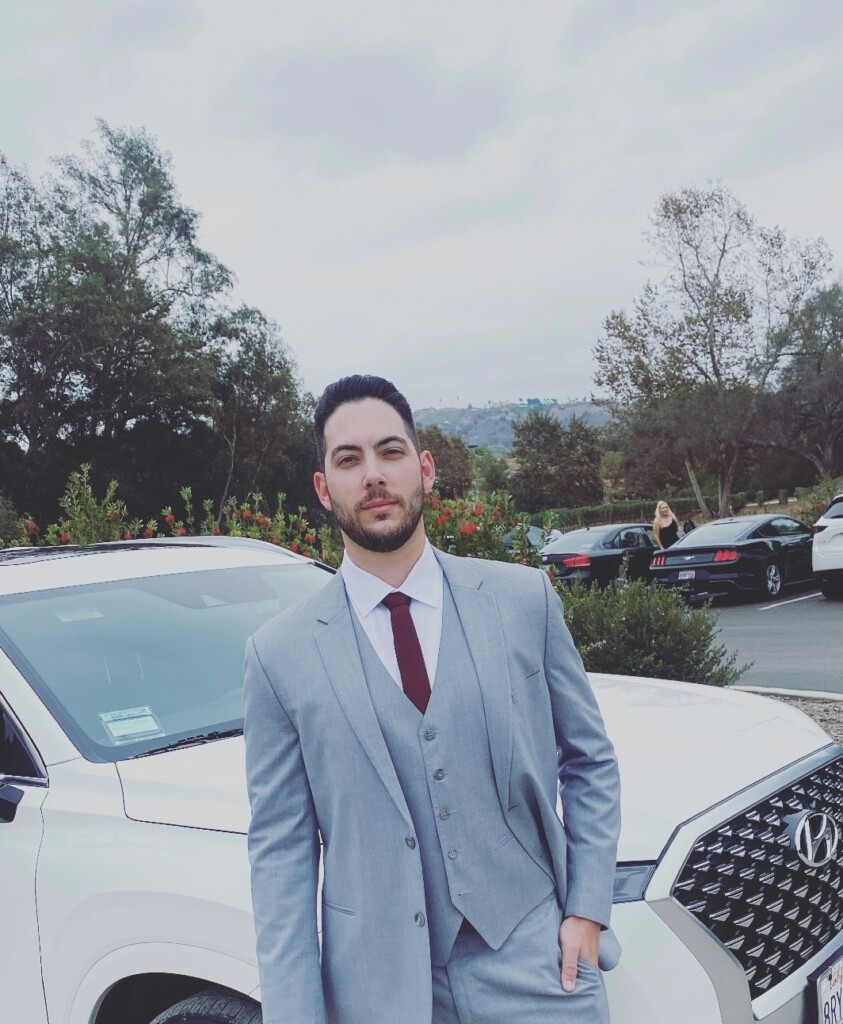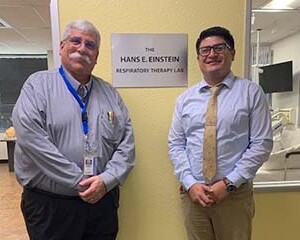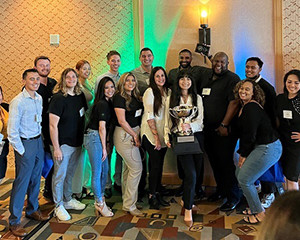Breathing New Life: How Austin Holder Found Purpose in Respiratory Therapy
 Austin Holder was at that place early-twenties tend to bring you: What do I want to do with my life? His options were pretty narrow. He had barely made it through high school and his minimum wage jobs bussing tables and retail sales were not exactly springboards to rewarding career options.
Austin Holder was at that place early-twenties tend to bring you: What do I want to do with my life? His options were pretty narrow. He had barely made it through high school and his minimum wage jobs bussing tables and retail sales were not exactly springboards to rewarding career options.
But Austin was fortunate to have had a couple of great career role models right in front of him. His parents were both in the Respiratory Therapy field: his stepdad, Ricardo, is a Respiratory Care Practitioner and educator and his mom, Tisha, a Respiratory Care Practitioner. Growing up, he had enjoyed the financial and professional comforts of their stable careers. Maybe he could recreate that vocation and lifestyle for himself and a future family.
Rubber was about to meet road. Did Austin have the mental and physical traction he would need?
How did your Respiratory Therapy career vision begin to take form?
When I was 19-years old I had a conversation with my stepdad about going to school to be a Respiratory Therapist. He was completely loving but said that based on how I’d performed in high school, I’d have to prove myself capable of something this challenging. I had to do an EMT (Emergency Medical Technology) program first to prove I was capable of something close to that level of education and career commitment.
I had already shadowed my mother at work in NICU (Neonatal Intensive Care Unit) and saw all the behind-the-scenes action; the autonomy, the respect Respiratory Care Practitioners (RCP) had, and it just blew me away. I want to do that; I want to be that.
What part of being a Respiratory Therapist held the greatest appeal?
To have the ability and knowledge, to know so many medical details to help others is just fascinating. And the autonomy and respect they (Respiratory Therapists) had for each other made me feel a part of something bigger than myself. I wanted to be in that position; an integrated cog to serve others.
And I wanted to be financially stable. I wanted to raise children and not worry if we wanted to send them to private school, as my sister and I had been able to do. I wanted to take care of my kids the way I was taken care of by my parents.
What was SJVC’s Respiratory Therapy program like for you?
I didn’t know what I was getting myself into at all. I’d never taken on such grueling study. A lot of it was because SJVC’s Respiratory Therapy program allowed you to take prereqs alongside core program classes. Other college programs expect you to have those classes done before you’re accepted – or even apply.
The bar and standards were set high. Excellence is what this program was giving you and excellence is what they expected from their students. I was looking for quality, and I knew that was what I was going to get this from this program.
Did you get the instructor support you needed?
I’m talking jaw-dropping support. Not just smart, but passionate; willing to sit with you for hours and discuss anything about the program. They’re going to push you to be the best clinician you can be. Every single one of them; five-six professors.
They’re experienced in their field. Prior to being an instructor, they were involved in legislation, building articles for ventilators. They had their names in textbooks, names in case studies and were really invested in this field. They were awesome.
Biggest surprise about the Respiratory Therapy program?
This program really put me in a position to excel beyond anything I ever thought I was capable of. They don’t just teach you these things and leave you out there to dry. I went from barely graduating high school to doing six college courses – and it was very difficult.
Instructor’s offices are right there next to the classrooms and when they see that passion in you, they invest in your success. But, as good as they are, it’s still on you.
Best thing about the Respiratory Therapy program?
I really enjoyed the community of students. They become your family (as few as) 19 months. You study together, start to see each other’s growth. You honestly can’t make it through without them.
Being able to help other people sitting in the classroom to get to that place of the lightbulb going on – like it went on for me – that was a favorite moment.
What was your greatest struggle?
I knew what it felt like in high school to sit down for a test and feel my stomach drop because I hadn’t prepared for it. But when you find what you love, you don’t want to go back to that feeling of failure.
I had to go from not knowing how to study at all to just figuring it out on my own. It took dedication and patience to develop a rhythm and good study habits. You start to realize you’re capable and wonder why you would ever go back to what it felt like to fail.
What kind of support did you have at home?
When I started the RT program I was living at home, but when my parents moved north, I lived with different family members for the last few months of the program. I lived with my grandmother, my cousin; life kept me moving around, but I had to make it work. It was never fun to bounce around, but the places I stayed were supportive and they would feed me.
But when I finished the program, at our pinning ceremony (2018 graduation), all my family was there. It was just amazing. I finished the program at the top of my class, in the Lambda Honors Society with a 4.0 GPA and it was the hardest thing I’d ever done.
Advice for others considering Respiratory Therapy career education?
It’s not for everybody, but if it’s what you’re passionate about, run for it hard. It sounds like a really long time, but it flies by. Set your sites on why you’re doing it, and that you will wake up tomorrow and it will be over. Cling to that and let it be the fire that fuels you.
Where are you now in your Respiratory Therapy career?
After I graduated from SJVC’s Respiratory Therapy program, I moved to northern California, took Board exams and obtained licensure. Fortunately, I was able to start the hiring process and orientation while that was in process. I have been a Respiratory Care Practitioner III since 2022 and currently work at North Bay Health Medical Center and teach Respiratory Therapy part-time.
What are your primary responsibilities?
They assign me every day to ER, ICU or one of the wards. I like ICU (Intensive Care Unit) best, as far as our scope of practice is concerned. It’s ventilator management, critical care and very high risk and fast-paced. That’s what appeals to me most: pace and intensity.
I walk into a room, introduce myself and begin treatment for everything from asthma to a comatose patient on a ventilator. I manage respiratory medications and note drips and drugs administered by nursing staff for patient stability. I’m pretty much responsible for breathing for them with whatever apparatus and treatments keep them functioning.
What is the best part of your day?
I just love the medical field; it’s fascinating to me. To take all you learned in school – critical thinking, theory, physiological processes, medical equipment – and use it in a way to help somebody quickly and appropriately – it’s just awesome.
You get good at hopping onto situations quickly and preventing them from decompensating even further. You can walk in and do only what the doctor tells you, or you can be a really good patient advocate and be proactive in patient assessment, diagnosis and treatment.
What is your next challenge?
Respiratory Therapy has been so good for me to benefit others’ lives, but I’m hungry to do more, be more. And the only thing that will satisfy that is to become a Physician Assistant or a doctor. Physicians have their hands in so many facets – all those things intrigued me.
I was recently accepted to start a Physician Assistant (PA) program. I’m saving up as much as I can and taking out student loans to devote everything to school. I will figure it out as I go along.
Are you confident you can make this happen?
When I was little, my mom (Tisha) would always hold my head in her hands and say, ‘You’re so brilliant’. She saw what I was capable of, she knew what was in there. It motivates me still.
How do you envision your future?
I see myself graduating from the Physician Assistant program and working a couple of years in a critical care setting to hone those skills, then maybe get into surgery. I might get my Doctorate; teach a Respiratory Therapy or Physician Assistant program.
What you know is never enough – and you want to go down that rabbit hole. It takes a certain kind of person. Maybe I’m that kind of person.
You might also like
More stories about
Request Information
All fields using an asterik (*) are required.


